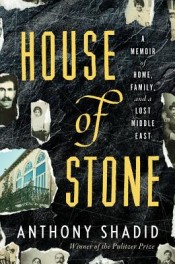Title: House of Stone: A Memoir of Home, Family, and a Lost Middle East
Author: Anthony Shadid
Genre: Memoir
Year: 2012
Acquired: Won in an online giveaway
Rating: 




One Sentence Summary: After years of being beaten down working as a foreign correspondent, journalist Anthony Shadid returned to rebuild himself as he rebuilt his ancestor’s ancestral home in war-torn Lebanon.
One Sentence Review: House of Stone is a melancholy and undeniably beautiful book about history, home, and family that I wanted to re-read the moment I turned the last page.
Long Review: In March 2011, foreign correspondent and Pultizer Prize-winner Anthony Shadid was captured, cuffed and beaten in Libya during the uprising against the dictatorship of Col. Muammar Al-Ghaddafi. When Shadid was released he decided to return to his great-grandfather’s crumbling estate in Lebanon, to rebuild the house and his spirit after many difficult years in a row. In House of Stone, which was published just after Shadid died in Syria from an acute asthma attack, and parallels Shadid’s story rebuilding the estate with the story of his family’s long immigration from Lebanon to the United States.
The first thing that struck me while reading House of Stone was how slowly the story moves along. It took me awhile to realize that this effort to slow down — a trick I’m still not quite sure show Shadid pulls off — is deliberate. It’s a reflection of both the pace of life in Lebanon and the pace needed to really reflect on the issues of home, family, faith, politics, history and identity that Shadid is writing about.
It’s also impossible to ignore the sense of melancholy that pervades the book, both mourning for the Lebanon that used to be and mourning for Shadid, knowing that he died so soon after finally, finally finishing the rebuilding of his house of stone. While I want to try to write about the book without talking about Shadid’s death, that context is impossible to ignore. I don’t think it makes the book more sad, just more poignant, perhaps, than it might otherwise be.
Given those factors — the pace and the mood — it’s probably not surprising that it took me a longer-than-normal time to read House of Stone. But that was ok. Shadid’s writing, whether it’s about himself or reflecting on his family and history, is just beautiful. It’s writing that you want to savor slowly, especially knowing that there isn’t much more of it to enjoy. But I think the best endorsement of the book that I can give is this one: when I finished House of Stone, I was sad that it was over and wanted to experience the book all over again for the first time.
Other Reviews:
If you have reviewed this book, please leave a link to the review in the comments and I will add your review to the main post. All I ask is for you to do the same to mine — thanks!


Comments on this entry are closed.
I wasn’t familiar with Shadid until news spread of his untimely death, and learning more about him posthumously makes me very interested in House Of Stone. I would imagine it would be hard to read without the cloud of his passing hanging over the narrative . . . but it sounds lovely and very worthwhile.
Yes, it’s almost impossible to read the book without his death being part of the reading experience. I didn’t want to think the book was better than it is because of that, but I’m confident the book stands on it own.
I agree with what Meg (and you) say. Shadid’s death must bring a decided air of haunting and melancholy to reading this book.
There are some beautifully sad moments, him reflecting on how much he loves being home and wants to stay there, that were so very melancholy.
Wow, sounds like a powerful read. I also was unfamiliar with Shadid till after his death – but this book sounds intriguing.
I wasn’t an expert on his career, by any means, but knew a bit about what he’d gone through.
This sounds like a very powerful book and like the perfect read for you.
This sounds interesting. I will have to keep it in mind.
Sounds like my kind of book. Might have to check this one out…
I hope you like it!